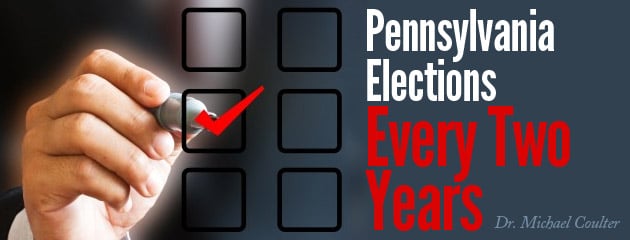
Pennsylvania will soon hold its primary election, something the state does every spring. As night follows day, a newspaper columnist or editorial board will bemoan the low turnout after the primary election, just as they do after other primary elections. But it’s not a surprise that there will be low turnout in Pennsylvania because there are few contested primary races across the state. Here’s a suggestion that might increase turnout in primary elections and save some taxpayer dollars at the same time: Pennsylvania should only hold elections once every two years. By doing so, it will give voters more reasons to turn out because there will likely be more contested elections.
Consider the lack of contested races this year. If you are a Republican, there’s only a fairly low profile U.S. Senate race and an even lower profile Auditor General race that affect all voters. (Yes, I know there’s a preference primary for president, but that race is already decided; and there are races for delegate/alternate delegate to the Republican Convention, but almost no one cares about those races.) Otherwise, only two of the state’s 18 congressional districts feature contested Republican primary races. Also for Republicans, only seven of the 25 state Senate primary races and only 27 of 203 state House primary races are contested.
If you are a Democrat, the only statewide race in which there is a primary is for the Attorney General nomination. Democrats have a few more primary races than the Republicans (in six of 18 races for U.S. House, in three of 25 state Senate races, and in 39 of 203 state House races), but still just under 20 percent of all possible races in Democratic primaries are contested. Both parties will be interested in six special elections to fill vacant seats in the Pennsylvania, but these races will impact only 3 percent of the state’s voters.
Few contested races means that voters are not being contacted by candidates and their representatives. Voters are not having their doors knocked on, nor are they getting phone calls or campaign mail pieces by multiple campaigns. For those not interested in elections, the absence of campaigning might be welcome, but all those contacts from campaigns provide information and encouragement to voters.
You can’t require primary races, so what can you do? The state could consolidate elections. That is, take those elections we have in odd-numbered years and move them to even-numbered years.
In odd-numbered years, Pennsylvanians elect local and county government officials as well as judges. All states have some or all local elections in odd-numbered years, but that wasn’t always the case. In the early 20th century, there was a move to separate local elections from federal elections so the local elections wouldn’t be affected by the political environments shaping federal elections, and the role of party organizations in electing local government officials would be minimized.
One consequence of separating local elections, however, is lower turnout for odd-numbered elections as compared to federal elections. A study by Zoltan Hajnal, Paul Lewis, and Hugh Louch (Public Policy Institute of California, 2002) found that municipal elections in even-numbered years led to 36 percent higher turnout when compared with local elections in odd-numbered years. In an article on the significance of the timing of elections (University of Chicago Law Review, 2010), Christopher Berry and Jacob Gersen further examined California election data and found that elections in November of even years were, on average, 23 percentage points higher than turnout in November elections in odd-numbered years. Berry and Gersen suggest that low-turnout elections might allow interest groups to have more influence in elections; they found that schools with elections in odd-numbered years have higher teacher salaries.
Berry and Gersen rightly acknowledge that having more elections in even-numbered years would lead to a longer ballot and that, the longer the ballot, the more races at the end of the ballot are skipped (this is sometimes called “roll off”). That’s an unintended consequence we should be aware of.
So Pennsylvania could take those municipal elections and move them to even-numbered years. It would lead to higher turnout as there would likely be more contested primary and general elections. There would be higher turnout for local elections compared to having them in odd-numbered years. Moreover, counties, which administer elections in Pennsylvania, might save a small amount of money as they would be paying election workers and paying for material (such as opti-scan ballots) only every other year. Or, it might allow for small increase in pay for these workers, which could attract individuals to these needed positions. The transition to all even-numbered elections could be difficult and some local elections might be overshadowed in even-numbered years, but the trade-off of more turnout would be worth it.

